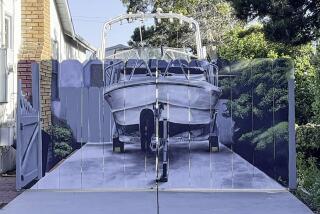Key West Houseboat Holdouts Are Evicted
KEY WEST, Fla. — The final bell tolled Tuesday for residents of Key West’s historic Houseboat Row, a bohemian colony of floating homes in the southernmost Florida city, made famous by novelist Ernest Hemingway.
The Florida Department of Environmental Protection and Monroe County sheriff’s deputies Tuesday evicted three holdout residents living on houseboats along the island city’s southeast sea wall.
About two dozen houseboat owners had heeded warnings to move their vessels to a city-owned marina at Garrison Bight across town or face fines of $100 a day.
Dale Adams, an official with the state Department of Environmental Protection, said the evicted residents were “polite and cooperative” when deputies advised them they had to leave.
But four houseboats and one abandoned, dilapidated vessel remained at the site after the evictions. Sheriff’s deputies were guarding them until the owners could move them, but gusty winds slowed the relocation.
“This represents a changing of the times in that it’s now viewed that houseboats should be kept in a maintained area,” Adams said.
The boat owners had lived rent-free at the site, which had no sewer hookups, while locked in 15 years of litigation with the government. To some Key Westers, Houseboat Row was an eyesore and an environmental hazard.
To others, it represented the freewheeling lifestyle Hemingway celebrated when the island was a fishing village and salvage port. The Nobel Prize-winning author wrote “A Farewell to Arms” and “To Have and Have Not” while living in Key West from 1928 to 1939.
Last week, a state appeals court turned down houseboat owners’ requests to extend their stay. Sheriff’s deputies posted notices before the eviction deadline, urging them, “Please be ‘gone’ upon our arrival.”
State officials have been lenient in imposing penalties of $100 a day, in effect since March 22, because of rough seas.
Key West attorney and former Houseboat Row resident Bill Sullivan said he still planned to petition the Florida Supreme Court to review the case, defending “an entire way of life that has existed for many years in the state of Florida.”
Houseboat Row began in the 1950s as a quaint colony of summer homes for high society. In the 1970s, it deteriorated into a collection of rustic shacks and colorful live-aboard vessels. Hurricane Georges smashed and submerged many of them in 1998, scattering splintered debris and leaving some residents homeless.
Also in 1998, city residents voted to save what remained of Houseboat Row, but the state, not the city, owns the waters under the sea wall and the state wanted it gone.
More to Read
Sign up for Essential California
The most important California stories and recommendations in your inbox every morning.
You may occasionally receive promotional content from the Los Angeles Times.









